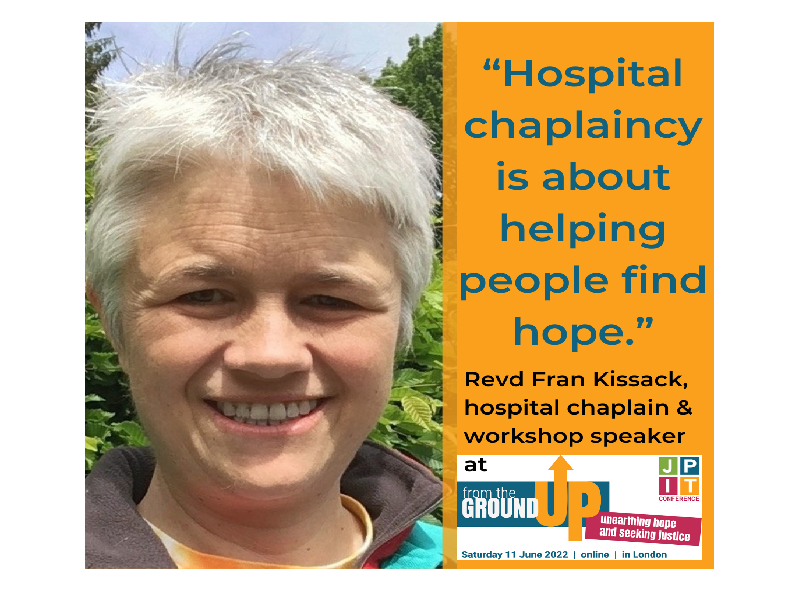Fran Kissack is a hospital chaplain in Yorkshire and a PhD student. She is also a minister of the United Reformed Church.
At the Joint Public Issues Team (JPIT’s) conference, ‘From the Ground Up: Unearthing hope and seeking justice’ taking place on 11 June from 10am-4pm, Fran will be leading a workshop on ‘Unearthing hope in healthcare’.
Here, Fran chats with Roo Stewart, Programme Support Officer (Church & Society), about how she has stayed hopeful despite the challenges of working in the healthcare sector during the pandemic.
The Joint Public Issues Team’s conference is about unearthing hope and seeking justice. Where do you find hope as you support those in a medical setting?
Other than my faith, I find hope in other people. Hope is in the compassion and care of hospital staff and in the unique special lives of all those I work with.
When do you struggle to find hope and how do you recharge?
It is hard to hope when I can see people being let down. The pandemic has highlighted staff and resource shortages which mean that people don’t always get the best care they could, and staff don’t always get to give the care they would want to. When systemic failures leave us helpless, it is easy to start to feel hopeless too.
I recharge by spending time around other people – especially my family – and I read, knit and have recently discovered a lockdown passion for crocheting blankets, of which we now have too many!
How do you seek justice in your role and ministry?
I speak out when I can. I keep it specific. Saying “it’s just not fair!” doesn’t get us anywhere, but calling out and campaigning against a particular injustice can see results. And I keep on praying – for a better-resourced and more just healthcare system.
What inspired you to step into this role? Is it what you thought it would be?
I’d say I fell rather than stepped into the role! The role found me at a time when our location and family circumstances meant ministering to a church congregation wasn’t an option. However, I had grown up being familiar with hospital visiting and had had a sense of calling to hospital chaplaincy while I was training for ministry.
Hospital chaplaincy has evolved tremendously in the twenty years I have been privileged to minister in this way – and yet it is still about people, their needs and priorities, and offering them the best pastoral and spiritual care I can. It is about helping people find hope.
How do you think Christians can offer hope to people with no hope or no faith?
Our chaplaincy team has a strapline – presence, understanding, hope. We offer hope by being there and listening attentively, trying to understand, and supporting people as they seek meaning and hope in their own lives. Some will find this hope in their faith, and supporting those who want to know more about following Christ is an immense privilege. For others, I will support them to explore their own meaning in different ways, to find their hope, not mine!
What top tip can you suggest to people who are struggling to keep going in a medical setting?
Ask to talk to a chaplain of course! It does help to talk, and often helps to talk to someone outside your immediate circle, about how you feel. And remember you are still you. You have not become your illness. In the words of the author, poet, playrwright and broadcaster Lemn Sissay OBE: “I am not defined by my scars, but by the incredible ability to heal.”
On-site and online styles of conference are available, with free tickets for under-25s and those with a low income. Find out more here.

